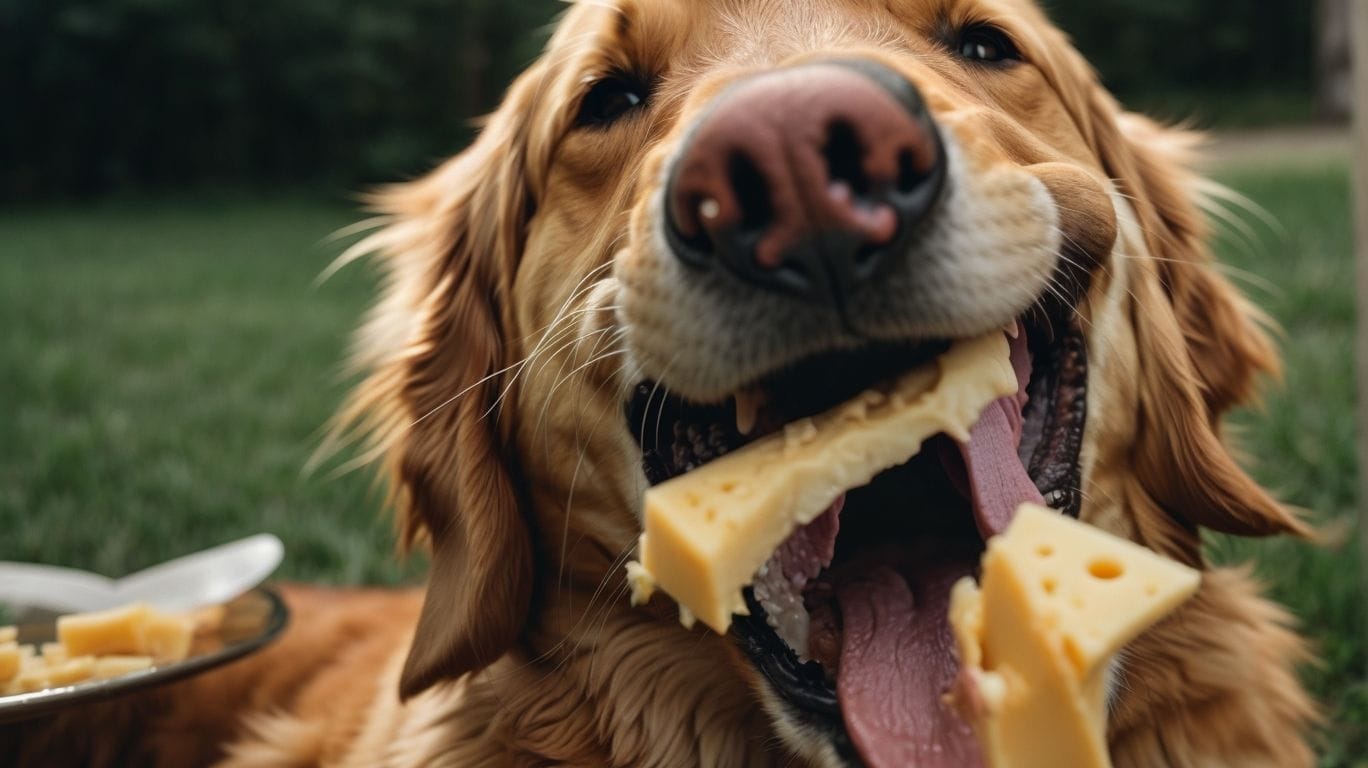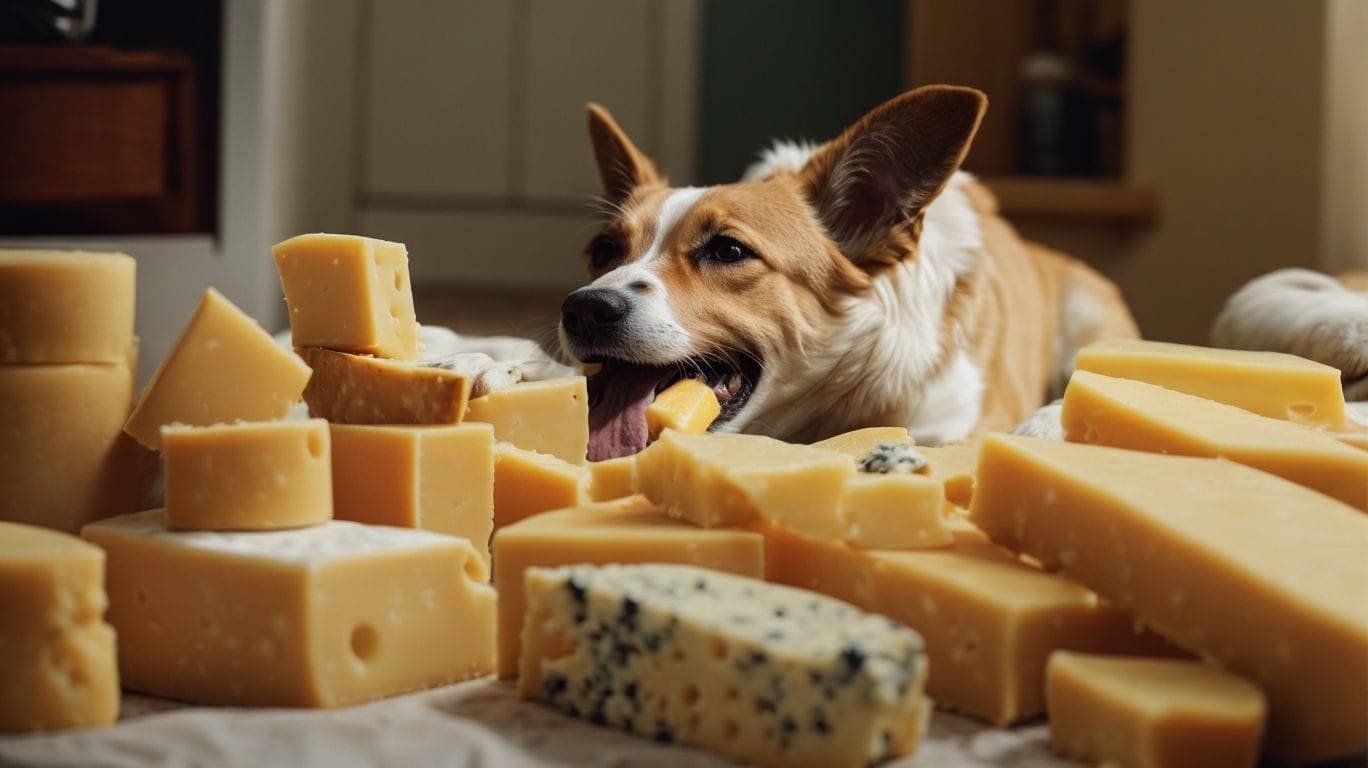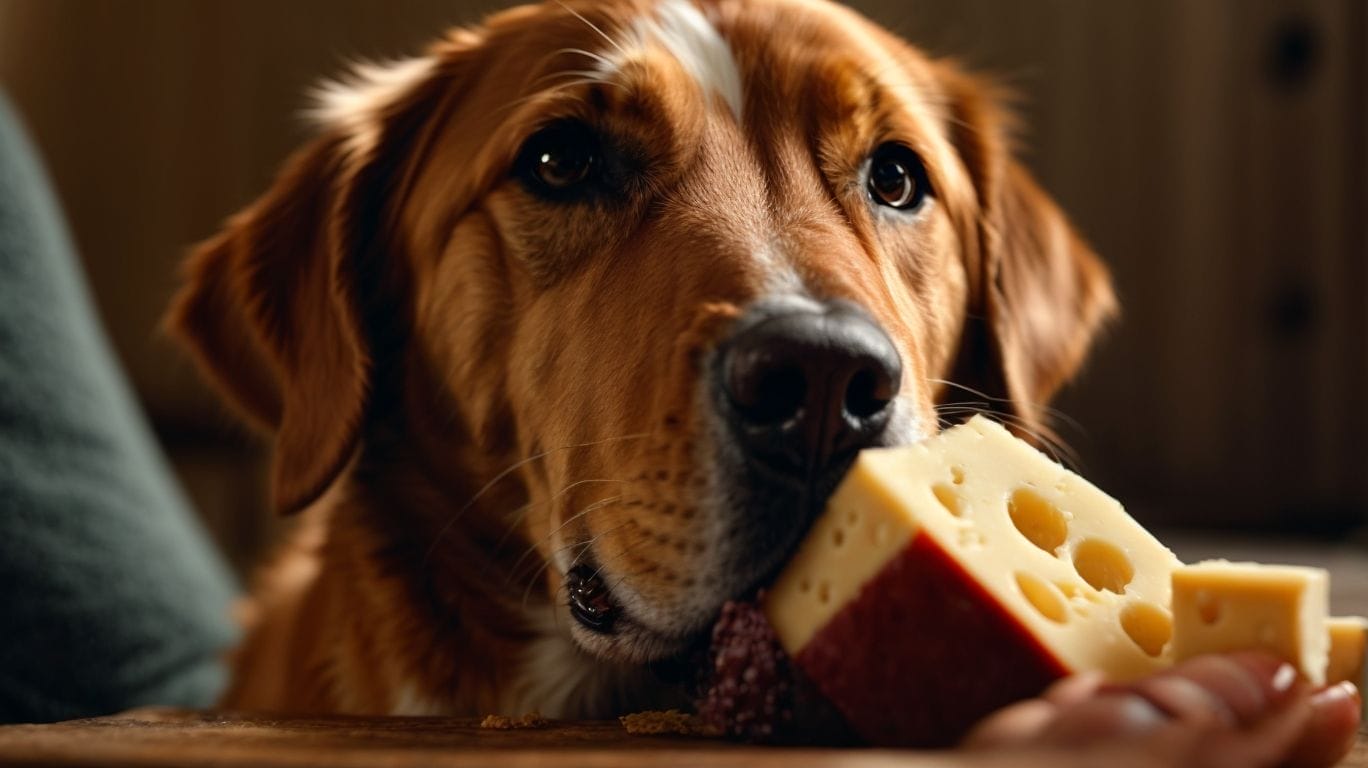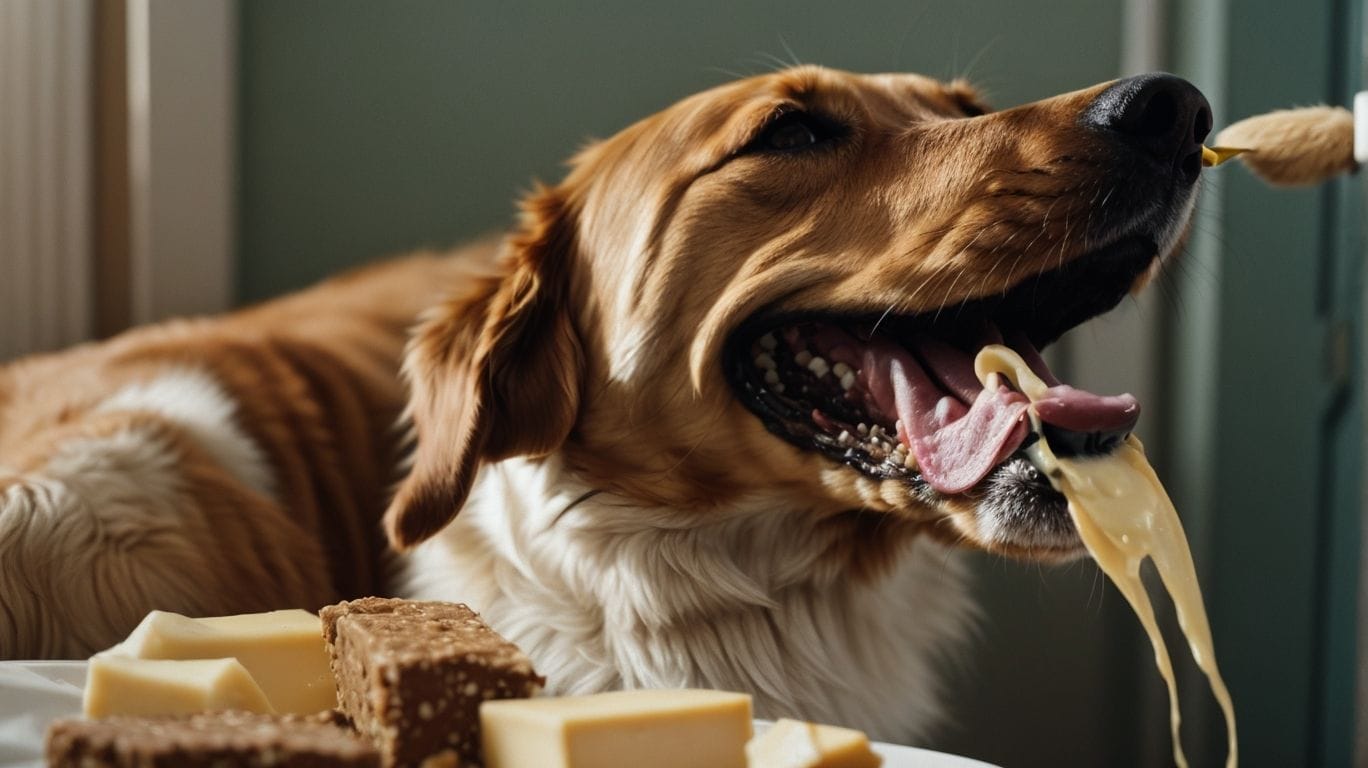The question of whether dogs can eat cheese is a common concern among pet owners. While cheese may be a tasty treat for humans, it’s important to understand its impact on our canine companions. According to experts in veterinary medicine, the safety of feeding cheese to dogs depends on a few factors. It’s necessary to consider the type of cheese and the dog’s individual dietary needs and health conditions.
When it comes to safe cheese options for dogs, certain types, such as cottage cheese and mozzarella, can be given in moderation. These varieties are lower in lactose and fat, making them easier for dogs to digest. However, other kinds of cheese, like blue cheese or cheese with added seasonings, can be unsafe and even toxic for dogs, leading to potential health issues.
While cheese can have some nutritional benefits for dogs, serving size and frequency are crucial. Cheese can be a good source of protein, vitamins, and minerals, but it should not replace a balanced and complete diet. It’s important to consult with a veterinarian to determine the appropriate portion size and to ensure the cheese complements the dog’s overall nutritional requirements.
There are a few risks associated with dogs eating cheese. Some dogs may experience digestive issues, such as diarrhea or upset stomach, due to lactose intolerance. Cheese is calorie-dense, and excessive consumption can contribute to weight gain and obesity in dogs. In rare cases, dogs may also have allergic reactions to certain types of cheese, leading to symptoms like itching or vomiting.
As every dog is unique, it’s crucial to consider their specific dietary needs and potential restrictions. If a dog is lactose intolerant, it’s best to avoid feeding them cheese altogether. There are alternative treats available that are specifically formulated for dogs and provide optimal nutrition without any potential risks associated with cheese. Always consult with a veterinarian to determine the most suitable and safe treatment options for your furry friend.
Key takeaways:
- Certain types of cheese are safe for dogs to eat: Some cheeses, like cheddar and mozzarella, can be fed to dogs in moderation as a treat or training reward.
- Cheese can provide health benefits for dogs: Cheese contains protein, vitamins, and minerals, which can support a dog’s overall health and contribute to their daily nutrient intake.
- Caution should be taken with cheese consumption: Too much cheese can cause digestive issues, weight gain, or allergic reactions in dogs, so it should only be given in small quantities and monitored for any adverse reactions.
Can Dogs Eat Cheese?

Photo Credits: Petnarnia.Com by Walter Rivera
Can Dogs Eat Cheese?
Dogs can indeed eat cheese, but it’s important to keep a few things in mind. Moderation is key when it comes to feeding cheese to your furry friend. Some dogs may have difficulty with lactose and may experience digestive issues after consuming cheese. Additionally, cheese is high in fat and calories, so it should only be given as an occasional treat. It is crucial to avoid certain types of cheese that can be harmful to dogs, such as blue cheese or any cheese containing additives like garlic or onion. If you’re uncertain about whether cheese is safe for your dog, it’s always best to consult with your veterinarian for personalized advice.
Is Cheese Safe for Dogs to Eat?

Photo Credits: Petnarnia.Com by Walter Martinez
Is Cheese Safe for Dogs to Eat?
Cheese can be a tasty treat for humans, but what about our furry friends? Many pet owners wonder, “Is cheese safe for dogs to eat?” The answer to this question depends on a few factors. Generally, cheese is not toxic to dogs, but it can lead to digestive issues due to lactose intolerance. It may cause diarrhea or an upset stomach. It’s important to note that certain types of cheese, such as blue cheese, contain substances that can be harmful to dogs. To ensure the well-being of your beloved pet, it’s always best to consult with a veterinarian before including cheese in their diet. In fact, I recently came across a story where a dog consumed an entire block of cheddar cheese and suffered from an upset stomach for several days. Therefore, remember that moderation is key when it comes to feeding cheese to dogs.
What Types of Cheese Are Safe for Dogs?
What Types of Cheese Are Safe for Dogs?
When it comes to feeding cheese to dogs, it is important to know which types are safe for them. Here is a table that provides information on safe and unsafe cheeses for dogs:
| Safe Cheeses for Dogs | Unsafe Cheeses for Dogs |
|---|---|
| Cottage cheese | Blue cheese |
| Mozzarella cheese | Spicy cheeses |
| Cheddar cheese | Soft goat cheese |
| Swiss cheese | Roquefort |
Remember, moderation is key, and it is important to introduce new foods gradually to avoid digestive upset. Some dogs may have specific health conditions or allergies that may restrict their cheese consumption. Consulting with a veterinarian is always recommended before making changes to your dog’s diet.
What Types of Cheese Are Unsafe for Dogs?
What Types of Cheese Are Unsafe for Dogs? Some types of cheese can be unsafe for dogs and should be avoided. Here are examples of unsafe cheeses for dogs:
- Blue cheese: Contains mold that can produce toxins harmful to dogs.
- Spicy cheeses: Spices like jalapeños or pepper flakes can irritate a dog’s stomach.
- Fatty cheeses: High-fat content can lead to Pancreatitis and digestive upset.
- Cheeses with added ingredients: Flavored or processed cheeses may contain harmful additives like garlic or onions.
- Lactose-rich cheeses: Dogs with lactose intolerance may have digestive issues if they consume lactose-rich cheeses like cheddar or Swiss.
It is best to stick to safe and dog-friendly cheeses like cottage cheese or small quantities of low-fat cheese, ensuring it is part of balanced and appropriate portion size for their diet.
What Are the Benefits of Dogs Eating Cheese?

Photo Credits: Petnarnia.Com by Scott Nguyen
What Are the Benefits of Dogs Eating Cheese?
Feeding cheese to your dog can have several benefits if done in moderation.
- Protein: Cheese is a good source of protein, which is essential for muscle growth and repair in dogs.
- Calcium: Cheese contains calcium, which helps in maintaining strong bones and teeth in dogs.
- Vitamins: Certain types of cheese, like cottage cheese, are rich in vitamins such as vitamin B12 and vitamin A, which support a healthy immune system and overall well-being.
- Taste and variety: Adding a small amount of cheese to your dog’s diet can enhance the taste of their food and provide some variety.
- Training tool: Cheese can be used as a training treat for dogs, as most dogs find it highly palatable.
Can Cheese Be a Good Source of Protein for Dogs?
Cheese can indeed be a good source of protein for dogs. However, it is crucial to offer it in moderation, considering its high fat and salt content. Opting for low-fat cheeses like cottage cheese can be a healthier choice. Protein plays a vital role in the development and repair of tissues, promoting overall canine health. Before incorporating cheese into a dog’s diet, it is imperative to consider their specific dietary requirements and any underlying health conditions they may have. Although cheese can contribute to protein intake, it should be just a small part of a balanced diet for dogs. Here’s a fascinating fact: Did you know that dogs have taste receptors for umami, the savory taste that can be found in cheese?
Does Cheese Provide Essential Vitamins and Minerals for Dogs?
Cheese can provide essential vitamins and minerals for dogs, but does it really provide these nutrients in moderation? Some types of cheese, such as cottage cheese or low-fat options, can be a good source of calcium, protein, and B complex vitamins. These nutrients are essential for maintaining strong bones, healthy skin, and a well-functioning immune system in dogs. However, it’s important to note that high-fat or spicy cheeses should be avoided as they can lead to digestive upset and weight gain in our furry friends. When feeding cheese to dogs, a pro-tip is to start with small amounts and monitor their response to ensure it agrees with their digestive system.
Does Cheese Help with Digestion in Dogs?
Does Cheese Help with Digestion in Dogs? Cheese can actually help with digestion in dogs, as long as it is given in moderation and the dog can tolerate lactose. Cheese contains probiotics, which are good bacteria that promote a healthy gut. These probiotics can aid in digestion and improve overall gastrointestinal health. It is important to note that not all dogs can tolerate dairy products, and too much cheese can lead to digestive upset and weight gain. If you choose to feed your dog cheese, start with small amounts and monitor their reaction. Other options for promoting digestion in dogs include prebiotic supplements and specialized digestive enzyme treats.
Remember to always consult with your veterinarian before making any changes to your dog’s diet.
Other treats that can aid in digestion in dogs:
| Pumpkin |
|---|
| Yogurt (if your dog is not lactose intolerant) |
| Apples |
| Carrots |
| Lean meats like chicken or turkey |
What Are the Risks of Dogs Eating Cheese?

Photo Credits: Petnarnia.Com by Ryan Flores
What Are the Risks of Dogs Eating Cheese?
When it comes to dogs indulging in cheese, there are several risks that all pet owners should be aware of. While cheese can indeed be a delectable treat for our furry friends, it is crucial to control their consumption. It’s worth noting that cheese contains a high amount of fat, which has the potential to contribute to weight gain and digestive complications if provided excessively. Moreover, some dogs may have trouble digesting lactose and could develop discomfort or diarrhea following the consumption of cheese. To ensure the well-being and overall health of your beloved pup, it is always advisable to consult with a veterinarian prior to introducing cheese or any novel food item into their diet.
Can Cheese Cause Digestive Issues in Dogs?
Can Cheese Cause Digestive Issues in Dogs?
Cheese has the potential to cause digestive issues in dogs, depending on a variety of factors. It is possible that some dogs may not tolerate dairy products well, which could result in upset stomachs or diarrhea. If consumed in large amounts, high-fat cheeses may also lead to Pancreatitis or weight gain. Additionally, dogs with lactose intolerance might experience symptoms such as gas or bloating when cheese is introduced into their diet. However, it is important to note that not all dogs will necessarily encounter digestive problems when consuming cheese. To ensure the well-being of your furry friend, it is crucial to carefully observe their response to cheese and introduce it gradually and in moderation. For dogs with sensitive stomachs, low-fat cheeses or lactose-free alternatives may be more suitable options. Nevertheless, it is always advisable to seek guidance from a veterinary advisor before implementing any dietary changes for your beloved pet.
Can Cheese Lead to Weight Gain in Dogs?
Consuming large amounts or regularly eating cheese can potentially result in weight gain in dogs. It is important to keep in mind that cheese is high in fat and calories, both of which can contribute to excess weight in dogs. Excessive weight in dogs can lead to various health issues, including joint problems, heart disease, and diabetes. To prevent weight gain, it is recommended to occasionally offer cheese to dogs in small portions as a treat. Alternatively, you can consider giving dogs leaner alternatives like low-fat cottage cheese in moderation. Maintaining a healthy weight in dogs requires a balanced diet and an active lifestyle. Here’s a pro tip: You can use cheese as a high-value training tool, but always be mindful of the portion size to avoid weight gain.
Can Cheese Cause Allergic Reactions in Dogs?
Can cheese cause allergic reactions in dogs?
How Much Cheese Can Dogs Eat?

Photo Credits: Petnarnia.Com by Henry Rodriguez
When it comes to feeding cheese to your furry friend, it’s important to remember that moderation is key. Dogs can have cheese, but the portion size should be small. Here are some guidelines to keep in mind:
- Serving Size: Dogs should have no more than 10% of their daily caloric intake from treats, including cheese. So, when it comes to how much cheese dogs can eat, it’s important to be mindful of their overall caloric intake.
- Lactose Intolerance: Some dogs may have difficulty digesting lactose in cheese, so start with small amounts and monitor their reaction. To determine how much cheese your dog can handle, it’s essential to pay attention to any signs of digestive discomfort or intolerance.
- Low-Fat Options: Opt for low-fat cheese varieties to reduce the risk of weight gain and other health issues. In terms of how much cheese dogs can eat, choosing healthier options can help prevent excessive calorie consumption.
Pro-tip: If you’re unsure about the amount of cheese your dog can eat, it’s always best to consult with your veterinarian for personalized advice. They can guide you on how much cheese is suitable for your dog’s specific dietary needs.
What Should Be the Portion Size of Cheese for Dogs?
When giving cheese to dogs, the portion size of cheese is crucial. A small amount of cheese is usually safe, but moderation is key. The portion size of cheese for dogs depends on various factors such as their size, weight, and overall health. It is generally recommended to give dogs no more than 10% of their daily calories from treats, including cheese. For instance, if you have a small dog weighing 10 pounds, they should consume approximately 200 calories per day, with no more than 20 calories coming from cheese. Therefore, it is always best to consult with a veterinarian to determine what the appropriate portion size of cheese should be for your dog’s specific needs.
Let me share a personal experience. I once gave my dog a large piece of cheese as a treat, thinking it wouldn’t cause any harm. However, he ended up having an upset stomach and diarrhea later that day. It was then that I quickly realized I had given him too much cheese. Since that incident, I have become careful and now stick to small portions when giving him cheese. As a result, he hasn’t experienced any further digestive issues. It’s crucial to remember that even though our furry friends love cheese, what should be the portion size of cheese for dogs is key to keeping them healthy and happy.
What If My Dog Is Lactose Intolerant?

Photo Credits: Petnarnia.Com by Bobby Torres
What should I do if my dog is lactose intolerant?
If your dog has difficulty digesting lactose, a sugar found in milk and dairy products, it means they are lactose intolerant. Giving your dog cheese or any other dairy product can result in digestive issues such as diarrhea, vomiting, or gas. To treat them, it is advisable to avoid offering cheese to lactose-intolerant dogs and instead choose lactose-free alternatives. It is important to consult your veterinarian to determine the best diet for your dog, especially if they have any dietary sensitivities or health conditions.
What Are Some Alternative Treats for Dogs?

Photo Credits: Petnarnia.Com by William Lewis
What Are Some Alternative Treats for Dogs?
When it comes to treating your dog, there are plenty of alternative options to cheese that are healthy and safe. Here are some ideas to consider:
- Fruits and vegetables: Offer your dog small pieces of apple, carrot, or blueberries as a tasty and nutritious snack.
- Peanut butter: A spoonful of peanut butter can be a delicious and protein-rich treat for your pup.
- Yogurt: Plain, unsweetened yogurt can provide your dog with a dose of probiotics and calcium.
- Lean meats: Cooked chicken, turkey, or lean beef can be given to your dog as a special treat.
- Dog-specific treats: There are plenty of commercially available dog treats that are specially designed for your furry friend’s nutritional needs.
Some Facts About “Can Dogs Eat Cheese?”:
- ✅ Dogs do not possess significant amounts of lactase, so dairy-based products like cheese can cause digestive upset. (Source: Our Team)
- ✅ cheese has a high-fat content, which can lead to weight gain and obesity in dogs. (Source: Our Team)
- ✅ Pancreatitis, a serious condition that can result in stomach upset and even death, can be triggered by eating cheese, especially for breeds prone to Pancreatitis. (Source: Our Team)
- ✅ Some cheeses may contain toxic ingredients like chives or garlic for dogs. (Source: Our Team)
- ✅ cheese and other treats should not account for more than 10% of a dog’s daily caloric intake to avoid weight gain and other health conditions. (Source: Our Team)


